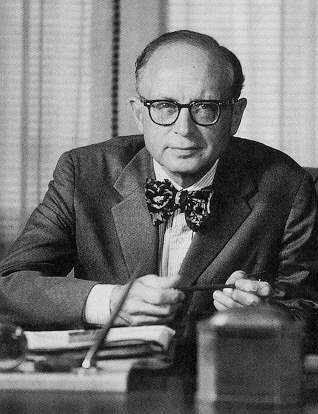I’ve learned any fool can write a bad ad, but it takes a real genius to keep his hands off a good one.

About Daniel J. Boorstin
Daniel Joseph Boorstinwas an American historian at the University of Chicago who wrote on many topics in American and world history. He was appointed the twelfth Librarian of the United States Congress in 1975 and served until 1987.
More quotes from Daniel J. Boorstin
An image is not simply a trademark, a design, a slogan or an easily remembered picture. It is a studiously crafted personality profile of an individual, institution, corporation, product or service.
American historian (1914-2004)
Some are born great, some achieve greatness, and some hire public relations officers.
American historian (1914-2004)
As you make your bed, so you must lie in it.
American historian (1914-2004)
The force of the advertising word and image dwarfs the power of other literature in the 20th century.
American historian (1914-2004)
A best-seller was a book which somehow sold well because it was selling well.
American historian (1914-2004)
Human models are more vivid and more persuasive than explicit moral commands.
American historian (1914-2004)
We need not be theologians to see that we have shifted responsibility for making the world interesting from God to the newspaperman.
American historian (1914-2004)
I’ve learned any fool can write a bad ad, but it takes a real genius to keep his hands off a good one.
American historian (1914-2004)
Freedom means the opportunity to be what we never thought we would be.
American historian (1914-2004)
The courage to imagine the otherwise is our greatest resource, adding color and suspense to all our life.
American historian (1914-2004)
A sign of celebrity is that his name is often worth more than his services.
American historian (1914-2004)
I write to discover what I think. After all, the bars aren’t open that early.
American historian (1914-2004)
Education is learning what you didn’t even know you didn’t know.
American historian (1914-2004)
Knowledge is not simply another commodity. On the contrary. Knowledge is never used up. It increases by diffusion and grows by dispersion.
American historian (1914-2004)
Reading is like the sex act – done privately, and often in bed.
American historian (1914-2004)
We suffer primarily not from our vices or our weaknesses, but from our illusions. We are haunted, not by reality, but by those images we have put in their place.
American historian (1914-2004)
The traveler was active; he went strenuously in search of people, of adventure, of experience. The tourist is passive; he expects interesting things to happen to him. He goes “sight-seeing.”
American historian (1914-2004)
Time makes heroes but dissolves celebrities.
American historian (1914-2004)
The greatest obstacle to discovery is not ignorance – it is the illusion of knowledge.
American historian (1914-2004)
We read advertisements… to discover and enlarge our desires. We are always ready – even eager – to discover, from the announcement of a new product, what we have all along wanted without really knowing it.
American historian (1914-2004)
As individuals and as a nation, we now suffer from social narcissism. The beloved Echo of our ancestors, the virgin America, has been abandoned. We have fallen in love with our own image, with images of our making, which turn out to be images of ourselves.
American historian (1914-2004)
Technology is so much fun but we can drown in our technology. The fog of information can drive out knowledge.
American historian (1914-2004)
The celebrity is a person who is known for his well-knownness.
American historian (1914-2004)
The most important American addition to the World Experience was the simple surprising fact of America. We have helped prepare mankind for all its later surprises.
American historian (1914-2004)
Nothing is really real unless it happens on television.
American historian (1914-2004)
A wonderful thing about a book, in contrast to a computer screen, is that you can take it to bed with you.
American historian (1914-2004)
The world of crime is a last refuge of the authentic, uncorrupted, spontaneous event.
American historian (1914-2004)